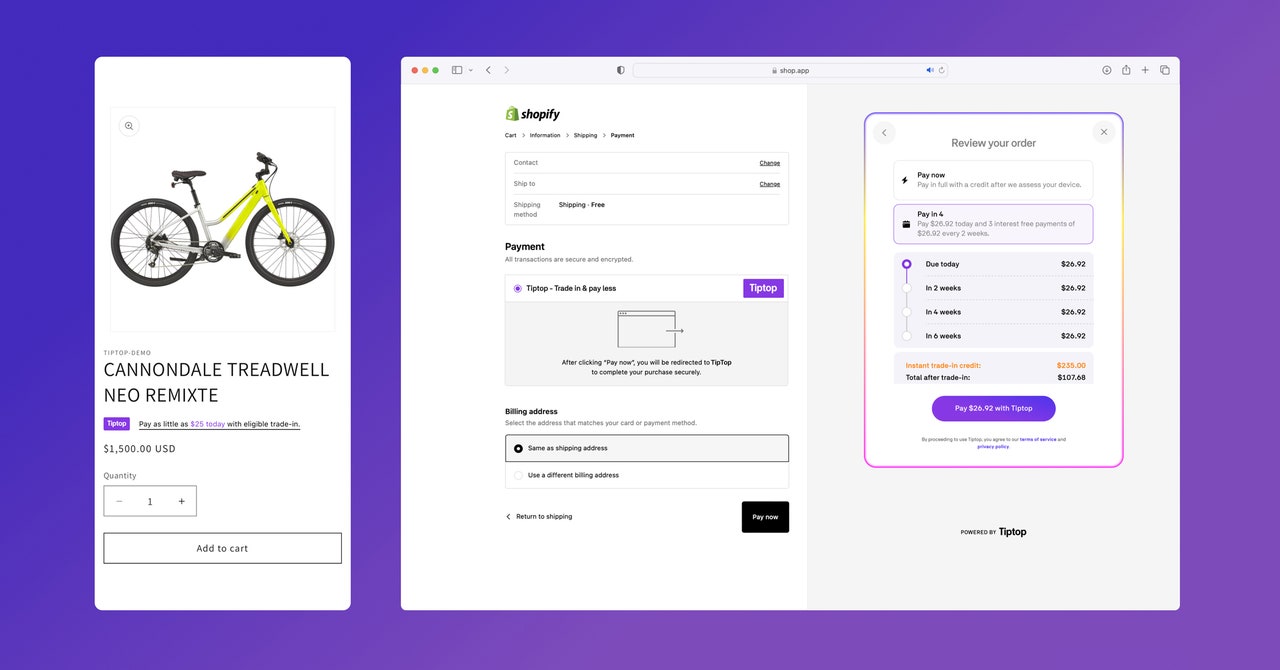
Lehmann says Tiptop has cataloged round 50,000 particular merchandise that it’s going to settle for as trade-ins. The corporate will take issues like your previous telephones, laptops, and child strollers, though some objects aren’t eligible for trade-in as a result of they’d be too pricey to ship. (You may’t commerce in your fridge, sorry.) Behind the scenes, Tiptop makes use of some algorithms to dynamically estimate the worth of all the things on its listing based mostly on market values and a few changes for depreciation. The trade-in costs you’ll be provided will clearly range. Lehmann says the typical low cost throughout all units which have come via Tiptop’s system thus far is about $287.
Tiptop is enabled as a fee gateway for Shopify, which suggests any on-line service provider that makes use of Shopify can allow Tiptop as a fee choice. Already on the Tiptop wagon are websites like Nothing and Phonedaddy, the infant storage firm Cradlewise, the gaming controller maker Backbone, and King of Christmas—a retailer that sells precisely what the identify implies. The retailers promoting the merchandise pay a charge to Tiptop similar to they’d for another fee processor. That charge is someplace between 5 and 12 p.c, Lehmann says, relying on the worth of the merchandise being traded in.
Commerce Union
The genesis of Tiptop began after Uber bought Postmates in 2020, when Lehmann says he took a while off to be with household and take into account what his post-Postmates life would possibly appear like. Seems the reply was very near dwelling.
“After some time I began fascinated with how my home is filled with stuff,” he says.
Not solely that, however it was filled with the sort of stuff he says is more and more arduous to do away with. At the moment’s client electronics usually have very fast improve cycles, with corporations making an attempt to breathlessly parkour their clients into shopping for the latest factor yearly. And when you do, there aren’t all the time good methods to do away with final 12 months’s merchandise that you simply don’t want anymore. Marketplaces like eBay or Craigslist require some elevate; you must take images, write an inventory, submit it, then work together with consumers and finally ship it out your self or go meet someone in a car parking zone for a handoff. Commerce-in packages provided by producers like Apple or Google are restricted to merchandise offered by that producer, and there are generally strings connected, like committing to purchasing one other gadget or service plan, or solely getting retailer credit score. Relatively than cope with these limitations and hassles, folks usually simply put their previous gadget right into a field or a drawer, the place it goes unused.
Lehmann sees all that stuff you’ve obtained mendacity round as a useful resource.
“In a nutshell, what Tiptop tries to do is give US households entry to a checking account they did not learn about,” Lehmann says. “If you need the latest factor, you must do one thing with the previous factor.”
It’s potential that Tiptop may assist usher in a brand new period of reusing units, however it’s additionally potential the other may occur. Lucas Gutterman, the director of the Designed to Final marketing campaign on the advocacy group US PIRG, worries that serving to folks pay much less for a more moderen gadget may entice them to improve extra usually, perpetuating the demand for that form of fast improve cycle that Lehmann says is a part of the issue.






